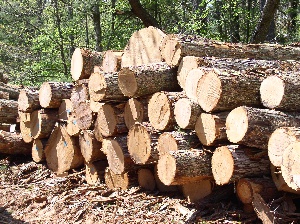The coming into force of the European Union Timber Regulations (EUTR), which seeks to ban the importation of illegal harvested timber products into the EU market, is likely to slow down the timber business in the country, B&FT has learnt.
This revelation comes on the backdrop of delay in the issuance of Legality Assurance Licences, which form a key component of the EUTR, by the government to exporters of timber products. The licence, among others, offers EU authorities the chance to certify that an exporter has complied fully with all the local regulations in accordance with the EUTR.
The issuance of the licence was expected to have started in 2012 as part of the conditions under the Voluntary Partnership Agreement (VPA) signed between Ghana and the EU in 2009. However, due to complexities involved in the process, the issuing of the Legality Assurance Licences could not be effected last year, and is not very likely to take place until 2014.
Dr. Kwame Asamoah Adam, Chief Executive Officer of Ghana Timber and Millers Organisation (GTMO), said the situation will make it difficult for timber firms in the country to honour their contract obligations to the EU, the highest consumer of the country’s timber products.
The impact of the current situation will affect very negatively the country’s timber industry, he said, considering the fact that about 70 percent of Ghana’s timber exports in terms of value -- and 30 percent in terms of volume -- goes to the EU market.
“The introduction of the EUTR, though well-intended to help sustain our forests, will in the interim slow down business,” he said. Already, some firms in the timber industry, including Naja David Logs and Lumber Limited as well as SAMATEX, are said to have had some contracts suspended.
Considering the current state of electricity supply in the country, coupled with the recent increment in fuel prices, this latest development poses a huge challenge to the timber industry, Dr. Adam said.
Fortunately however, the Timber Industry Development Division of the Forestry Commission is said to be in crucial talks with EU authorities to find an immediate solution to the problem.
Available information suggests the EU authorities may allow timber exports from the country on condition that exporters exercise due diligence by way of providing the necessary documentation to certify that their products were legally sourced.
Dr. Adam said: “Besides other interventions being pursued to mitigate the outcome of the passage of the EUTR -- at a time when the country has not been able to fully satisfy all the conditions under the Voluntary Partnership Agreement (VPA) -- intensive education is already underway to position the local industry to be able to comply with the interim arrangement being put in place.”
The EUTR came into effect this month and prohibits the sending of timber products to the EU market if they were illegally harvested. It sets out measures to be taken by those trading timber products within the EU to minimise the risk of illegal timber being sold.
The regulations apply to two types of organisations within the EU timber supply-chain classified as operators and traders. The operators are those who first place timber products on the EU market and as a result carry the bulk of the responsibility, while traders are those who buy or sell timber products already on the market and are required to keep records of who they buy from and sell to.
Business News of Monday, 11 March 2013
Source: B&FT

















